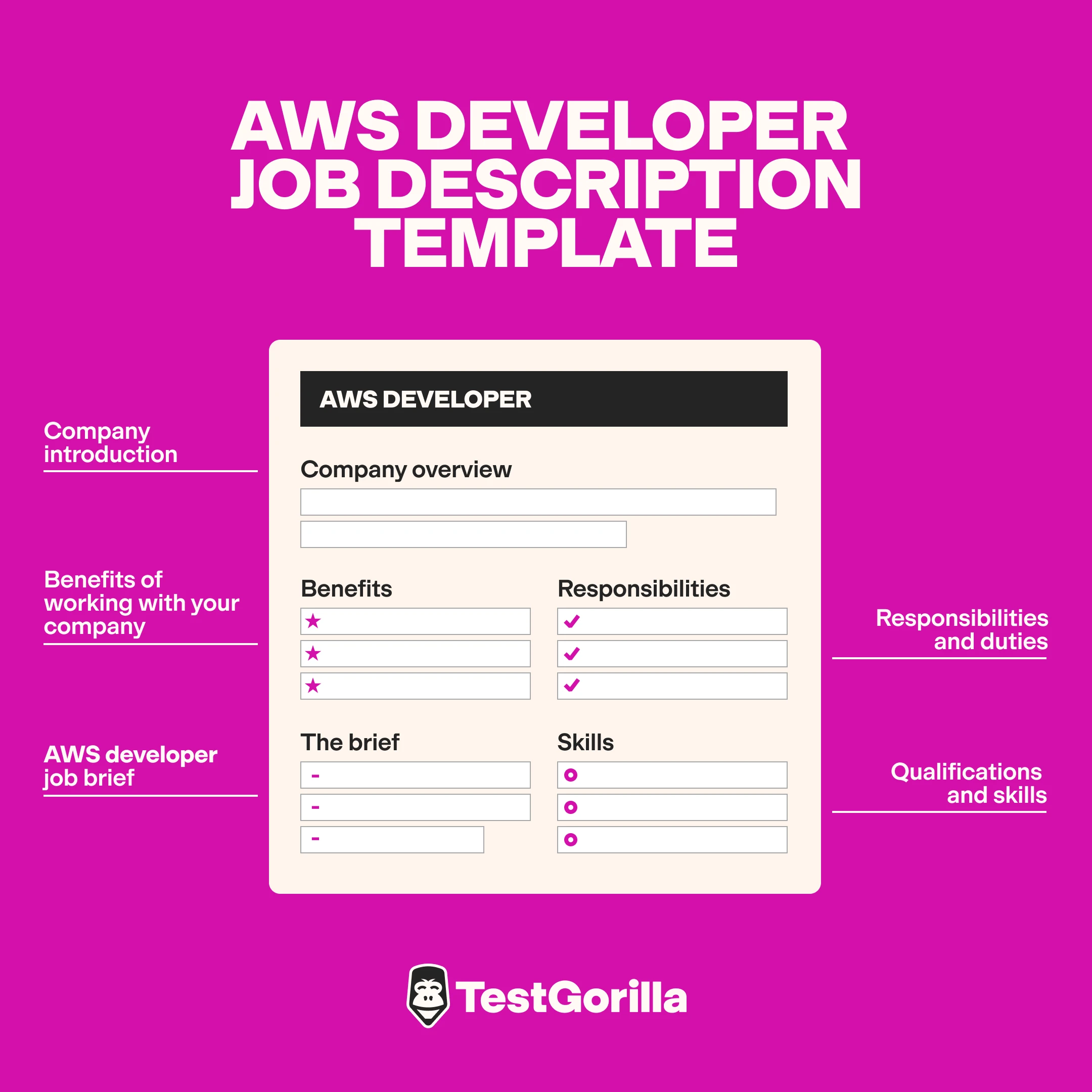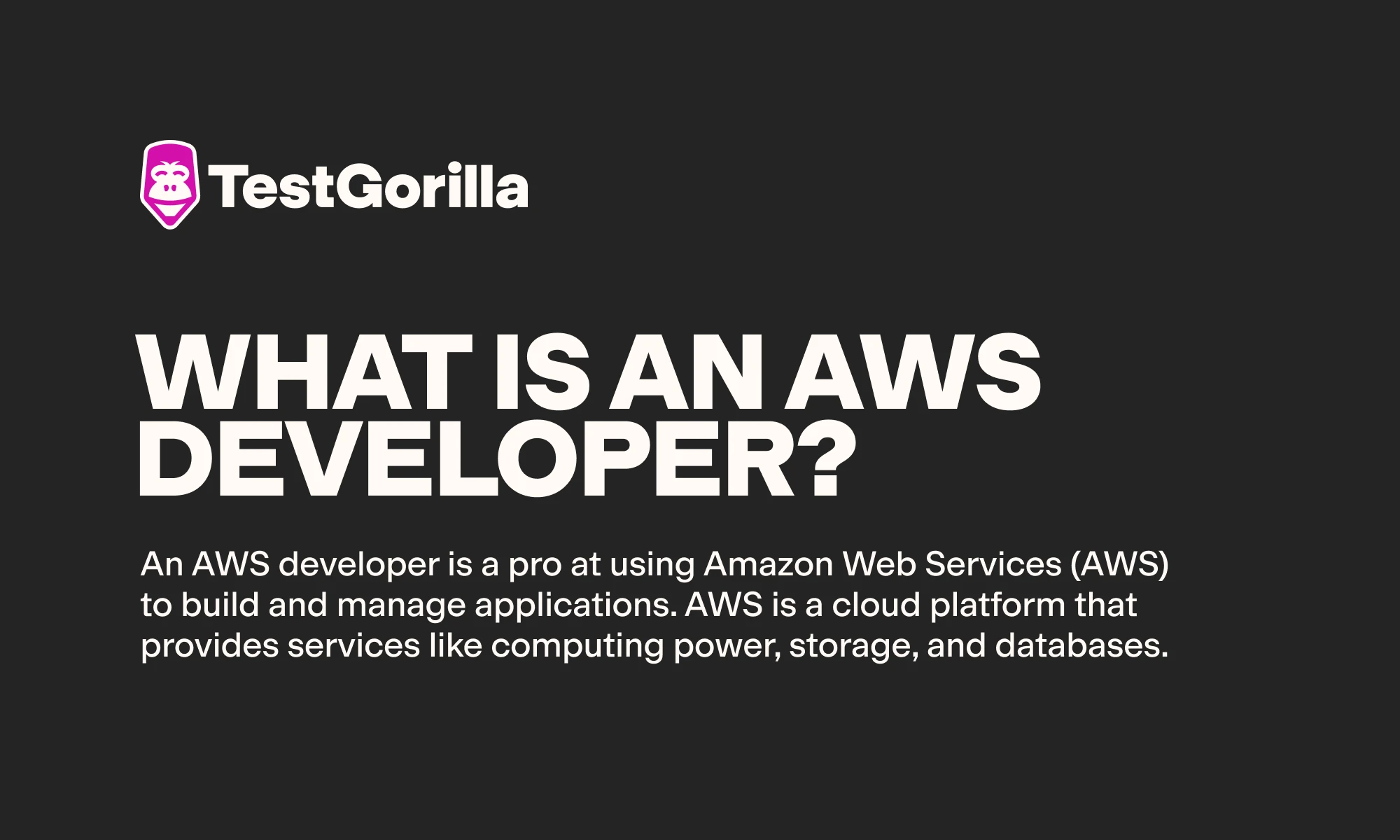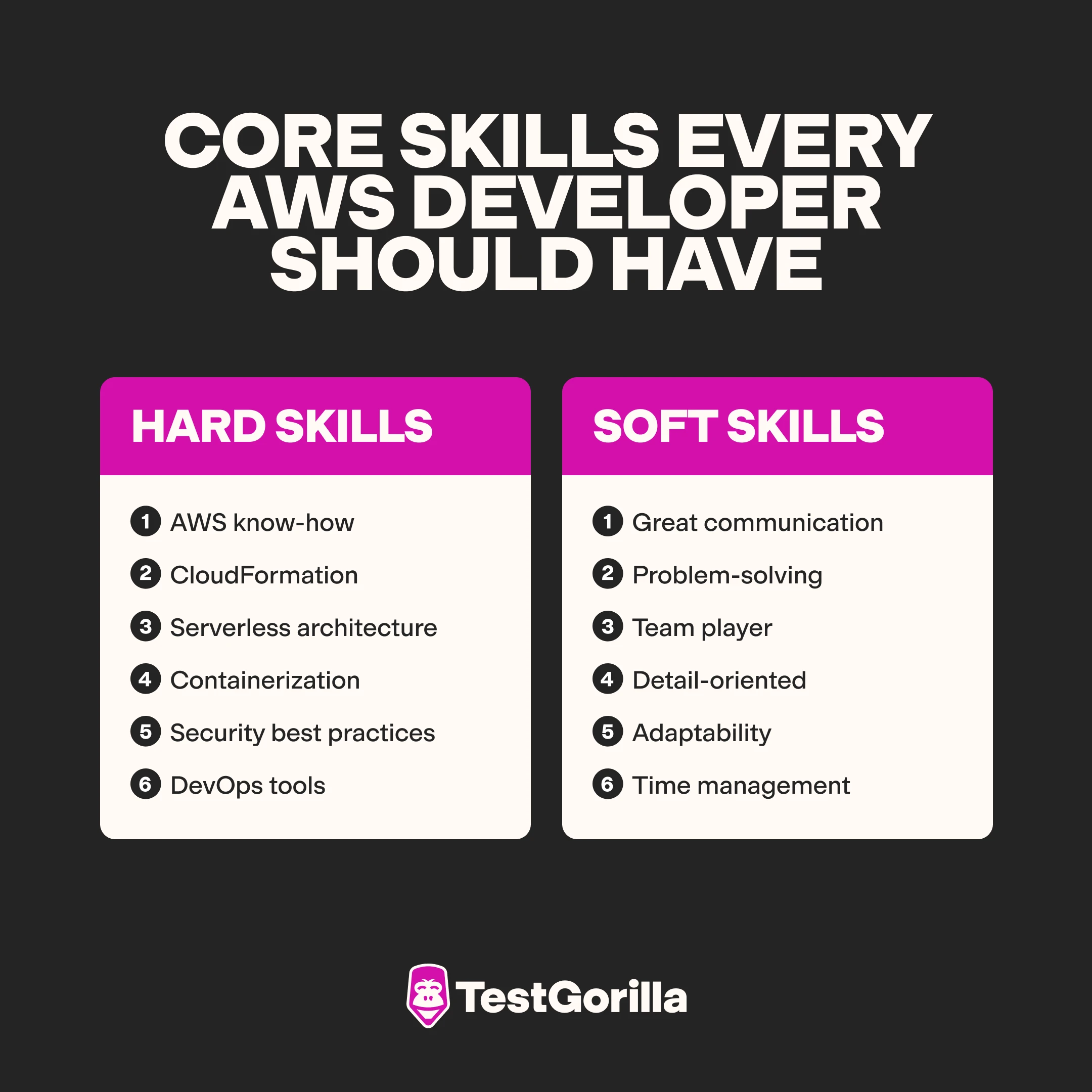AWS Developer job description template
Company Introduction
[Company Name] is a pioneering technology company committed to delivering top-notch solutions using the latest advancements in cloud computing. Our company culture is built on collaboration, innovation, and continuous learning. At [Company Name], we believe in empowering our employees to achieve their best and contribute to meaningful projects that drive our success.
Benefits of Working with [Company Name]
Working at [Company Name] offers numerous advantages, including flexible working hours, a comprehensive benefits package, and ample opportunities for professional growth. Our team members enjoy a supportive work environment, regular team-building events, and the chance to work with cutting-edge technologies in a dynamic and fast-paced setting.
AWS Developer Job Brief
As an AWS Developer at [Company Name], you will be responsible for designing, developing, and maintaining cloud-based applications and services on the AWS platform. You will collaborate with cross-functional teams to ensure the scalability, reliability, and performance of our AWS infrastructure.
[Company Name]
Job Title: AWS Developer
Reports to: [ ]
Position Type: [For example, full-time or part-time]
Location: [Remote, hybrid, on-site, address, etc.]
Salary and Benefits: [Salary and benefits details]
Responsibilities and Duties
Design, develop, and deploy cloud-based applications and services on AWS.
Collaborate with cross-functional teams to define, design, and implement new features.
Maintain and optimize existing AWS-based applications.
Ensure the performance, security, and scalability of AWS solutions.
Implement and manage CI/CD pipelines for AWS deployments.
Troubleshoot and resolve issues in development, test, and production environments.
Stay updated with the latest AWS services and best practices.
Skills and Qualifications
Required Skills and Experience:
Proven experience as an AWS Developer or similar role.
Strong knowledge of AWS services (e.g., EC2, S3, Lambda, RDS).
Proficiency in programming languages (e.g., Python, Java, Node.js).
Experience with containerization technologies (e.g., Docker, Kubernetes).
Familiarity with CI/CD tools and processes.
Solid understanding of cloud security best practices.
Preferred Skills and Experience:
Advanced degree in a related field.
AWS certification (e.g., AWS Certified Developer).
Experience with infrastructure as code (IaC) tools (e.g., Terraform, CloudFormation).
Knowledge of microservices architecture.
Experience with monitoring and logging tools (e.g., CloudWatch, ELK Stack).
[Company Name] is an equal-opportunity employer. We celebrate diversity and are committed to creating an inclusive environment for all employees. We look forward to welcoming you to our team!
Table of contents
- What is an AWS developer?
- Key skills to look for in an AWS developer
- How to write an effective AWS developer job description
- 3 things to avoid when writing a job description for an AWS developer
- Next steps: Attracting and assessing AWS developer candidates
- FAQs
- Attract and assess AWS developers with TestGorilla
What is an AWS developer?
An AWS developer is a pro at using Amazon Web Services (AWS) to build and manage applications. AWS is a cloud platform that provides services like computing power, storage, and databases.
These developers handle tasks like deploying and maintaining servers, setting up storage solutions, and creating serverless functions. They also manage security settings, optimize performance, handle databases, troubleshoot issues, and ensure the entire cloud infrastructure runs smoothly.
In a nutshell, they make the most of AWS's cloud tools to keep apps running at their best.
Key skills to look for in an AWS developer
When looking for an AWS developer, there are some specific skills you'll want to keep an eye out for:
Hard skills
AWS know-how: A solid grasp of Amazon Web Services, especially core services like EC2, S3, Lambda, and RDS.
CloudFormation: Ability to use AWS CloudFormation to create and manage resources with infrastructure as code (IaC).
Serverless architecture: Experience working with serverless services like AWS Lambda, API Gateway, and DynamoDB.
Containerization: Knowledge of containerization, which involves bundling an application with everything it needs to run (like libraries and dependencies) into one package. Familiarity with tools such as Docker and AWS services like ECS and EKS to manage these containers.
Security best practices: Understanding AWS security, including IAM roles, policies, and encryption techniques.
DevOps tools: Familiarity with AWS DevOps tools like CodePipeline, CodeBuild, and CodeDeploy for smooth, continuous integration and deployment.
Soft skills
Great communication: Can explain technical AWS concepts to non-tech team members and keep everyone up to speed.
Problem-solving: Great at quickly spotting and fixing issues in AWS environments, whether it's a configuration problem, a performance bottleneck, or a security gap.
Team player: Good at working with different teams, including developers, operations, and stakeholders.
Detail-oriented: Makes sure AWS services are configured and deployed accurately to avoid issues and optimize performance.
Adaptability: Quick to learn and adapt to new AWS services and updates.
Time management: Great at juggling multiple AWS projects and tasks, making sure everything gets done on time and to a high standard.
The best insights on HR and recruitment, delivered to your inbox.
Biweekly updates. No spam. Unsubscribe any time.
How to write an effective AWS developer job description
Follow these three best practices for an effective AWS developer job description.
1. Highlight real-world problem-solving
Explain that candidates need to handle real-world AWS issues to show they can effectively manage and improve cloud systems. Mention scenarios like troubleshooting a sudden drop in application performance or quickly resolving security vulnerabilities. This proves they can handle the practical challenges businesses face when using AWS.
Example: “You’ll need to identify and resolve performance bottlenecks in our EC2 instances or secure our S3 buckets against unauthorized access quickly and effectively.”
2. Stress the importance of automation skills
Automation is key in AWS because it helps developers manage cloud resources faster and reduces the chance of human error. Look for candidates who have experience setting up automated workflows and deployments.
Example: “We're looking for someone who can automate our deployment processes using AWS tools like Lambda, CloudFormation, and CodePipeline to reduce manual work and speed up our application releases.”
3. Encourage continuous learning and certification
Make it clear that you value ongoing learning and AWS certifications. For instance, mention chances for promotion, ongoing training, and AWS certification support. This shows your candidates that you’re invested in their future while keeping your teams engaged and up to date on the latest cloud technology.
Example: “AWS certification is a plus, especially if you have certifications like AWS Certified Solutions Architect or Developer. We value candidates who love to learn and stay updated with the latest AWS services and best practices to keep our team ahead of the curve.”
3 things to avoid when writing a job description for an AWS developer
When creating a great job description for an AWS Developer, you’ll want to watch out for these mistakes.
1. Avoid unrealistic expectations
Don't set the bar too high with impossible expectations. Be realistic about the experience and skills required. For example, asking for 10+ years of experience with technologies that have only been around for a few years can be a red flag for candidates. Instead, clearly define the necessary and preferred qualifications.
2. Don’t overlook soft skills
AWS developers need more than just technical prowess. Emphasize soft skills like problem-solving, critical thinking, and adaptability.
For instance, you could include ”ability to think through and resolve complex AWS service issues,” “strong teamwork skills to collaborate with cross-functional teams,” and “adaptability to quickly learn and apply new AWS technologies.” This helps to paint a fuller picture of the ideal candidate.
3. Skip the one-size-fits-all approach
Don't just use a generic job description template that doesn't fully capture the unique aspects of your AWS Developer role. Prepare your job description for a skills-based hiring approach that also reflects your company's specific needs and culture.
Highlight unique projects or technologies your team is working on. Figure out what makes your organization stand out and communicate that to your candidates.
Next steps: Attracting and assessing AWS developer candidates
Now that you’ve got a first-rate job description, share it online via social media, job boards, and popular AWS subreddits and LinkedIn groups.
Then, it’s time to assess the candidates who come knocking. How? By using unbiased, science-backed pre-employment testing platforms like TestGorilla. Our library of 400+ tests pinpoints candidates’ technical, behavioral, and cognitive skills with accuracy.
This way, you can toss that pile of resumes and lock in on what candidates are actually capable of doing on a daily basis if hired.
Here are a few tests to start with when assessing your AWS developer candidates:
Don’t forget about candidates’ personalities and their potential to add to your company’s culture. Mix and match the above tests with our Culture Add test and DISC Personality test for a 360-degree view of each candidate.
FAQs
Here are some common questions about AWS developers.
Do AWS developers need coding skills?
Yes, AWS developers need coding skills. They use languages like Python, Node.js, or Java to automate tasks, build serverless applications, and manage AWS services. Coding helps them write scripts, set up infrastructure, implement security, and handle data efficiently.
How do I describe the work environment and culture for an AWS developer role?
Be honest and specific about your company’s work environment and culture. Mention whether the role is remote, hybrid, or on-site. Highlight aspects that AWS developers may find appealing, like teamwork, innovation, and flexible hours. Put your culture front and center emphasizing collaborative projects or support for continuous learning.
What are some common challenges AWS developers face, and how should these be addressed in a job description?
AWS developers often have a lot on their plates. They manage complex cloud infrastructure, ensure security and compliance, optimize performance, and keep up with new AWS features. In your job description, mention how your company helps with these challenges. Highlight support like ongoing training, a dedicated security team, and resources for performance monitoring.
Attract and assess AWS developers with TestGorilla
AWS developer candidates aren’t always easy to come by. That’s why learning how to craft an engaging and accurate job description is key to attracting them.
Don’t waste your hiring team’s or your candidates’ time with paper-thin hiring strategies that put resumes and degrees on a pedestal. Opt for objective, skills-based hiring strategies instead.
With TestGorilla’s extensive library, you can quickly assess each candidate’s unique skill set and share the results with your team.
Ready to start hiring for skills? Get started with TestGorilla today by requesting a free live demo or signing up for our free plan.
You've scrolled this far
Why not try TestGorilla for free, and see what happens when you put skills first.

















